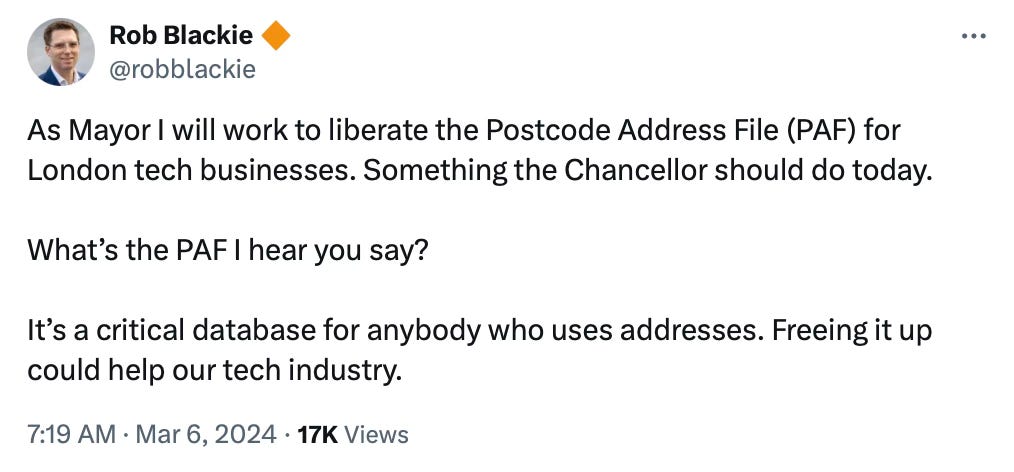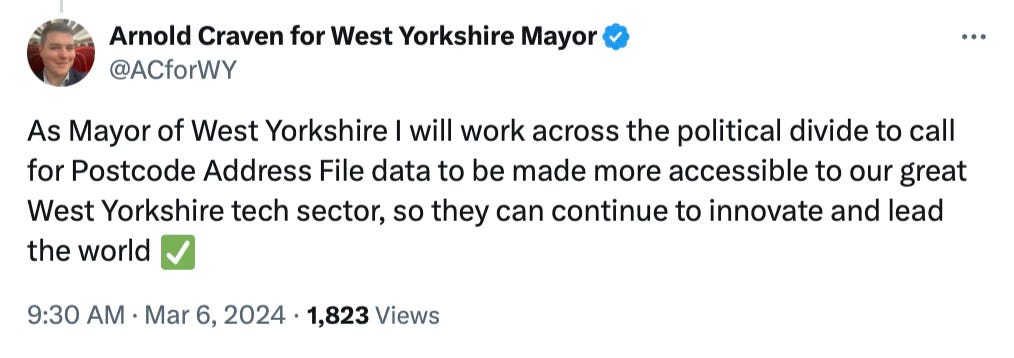Odds and Ends #31: Britain's new AI supercomputer is a shipping container in a car park
Plus a London Mayoral candidate backs liberating the Postcode Address File!

Hello! It’s time for Odds and Ends, your newsletter-within-a-newsletter rounding up the best links I’ve seen this week, with some mini-takes thrown in for good measure1.
This week is, er, a James O’Malley special again as I’ve got a bunch of other things I’ve done/am vaguely linked to, to tell you about. We’ve got an update on the campaign to liberate the PAF – including two exciting new endorsements. We’ve got a couple of pieces I wrote for other places – and a podcast where we calibrate our panic about the US election. And then there is, mercifully, some stuff that was made by other people.
So let’s get started!
LibDem London Mayoral Candidate backs liberating the Postcode Address File!
First, some very exciting news. I’m delighted to report that Rob Blackie, who is the Liberal Democrat candidate for the Mayor of London has been shamelessly pandering to O’Malleyist voters by pledging his support for liberating the Postcode Address File (PAF).
In a brilliant Twitter thread, he explains his thinking – pointing to the difficulty of bootstrapping a small business that uses address data. If you need to stump up the £6000+ fees before you can even launch, that’s going to prevent a lot of entrepreneurs from ever getting started.
And though the PAF is obviously something that the national government will ultimately have liberate, Rob argues that the Mayor of London can play a role here – and not just by using the Mayor’s bully pulpit.
“At the minimum the Mayor can pressure national government,” he says, “But there are other options available - for instance London government could cut a deal directly with Royal Mail to make the PAF available freely to London based tech businesses.”
In any case, this is great news, and it also presents a bold challenge to Rob’s rivals: Will Sadiq Khan and Susan Hall join him in supporting London’s small businesses, and also call for the PAF to be free?
…And the Conservative West Yorkshire Mayoral Candidate backs PAF liberation too!
And how about this for a bonus PAF liberation endorsement? After Rob made his announcement, the Conservative candidate for West Yorkshire Mayor, Arnold Craven also tweeted his support!
“I’ve been asked a lot about this in the last 48 hours (who knew postcodes interested so many people?),” said Craven – citing the work of PAF hero Tom Forth, “My position is clear. I believe in the power of business to innovate and drive growth. The state has the ability, with PAF, to liberalise a market & let businesses thrive.”
So it’s exciting to see politicians of all stripes get on board - now we’ve got Conservatives, Labour, LibDems and even Green politicians supporting the cause. Let’s hope that they can persuade their colleagues to back the forthcoming Lords Amendment.
What’s Happening Now: Should we care who’s President?
Make sure you check out this week’s edition of What’s Happening Now, the podcast I do with my comedian pal Sam Hampson. This week we’re talking about the US election with my friend, the excellent Karin Robinson, who is an actual American and a former Obama field organiser. We talk about exactly how nervous we should be given the state of the polls, what the Democrats can do to not fuck this up, and the stakes of the election for British people (spoiler: Trump winning wouldn’t be great!).
Go listen and subscribe wherever you get your podcasts! [Spotify] [Apple Podcasts]
Britain’s AI supercomputer, Isambard AI, is a shipping container in a car park (by me, for The House)
The reality is perhaps slightly less eye-catching, as it turns out the future will soon be found inside a liquid-cooled, 40ft shipping container, placed in the car park at the National Composites Centre in Bristol.
This container is set to be the home of Isambard-AI, a new £225m supercomputer that, along with the Dawn supercomputer in Cambridge, will form the National AI Research Resource. The hope is that, together, they will bolster Britain’s position as an AI power-player, and the government hopes it will keep Britain at the forefront of the emerging technology.
Remember the announcement of a new AI supercomputer at Rishi’s big AI conference last year? “Isambard AI” is going to be part of our new National AI resource – and I’ve been digging into why we need it and what it will actually do for The House magazine.
So please do click through and read the piece in full. But one specific thing I wanted to highlight, as I don’t think it has been picked up elsewhere, is exactly what the supercomputer looks like.
When the announcement was made, it was reported that it was going to be based at the National Composites Centre (NCC) in Bristol – so I imagined a large, shiny-floored data-centre. But it turns out that the supercomputer is instead going to be housed inside basically a shipping container in the NCC’s car park.
On one level, this sounds a bit ridiculous – and you can imagine more tawdry publications using it to paint an underwhelming picture of the new resource. But I think this is brilliant. The system is designed to fit into a container so it can be built remotely and shipped in, and then conceivably expanded later on. The only limiting factor is how much electricity they can feed into the system. So though it may not look spectacular, it’s going to help British scientists do some cool research.
Anyway, go and read the piece to find out more!
The big project to map the world beneath our feet (also by me, for The House)
The National Underground Asset Register (NUAR) is, in essence, Google Maps for the world beneath our feet. Water mains, gas pipes, electricity wires, broadband cables and all the other invisible infrastructure that keeps society functioning will be mapped on the new system, which over the last few years has been piloted in the North East, Wales and London.
One of my goals of this newsletter (other than to pick fights and bang on about postcodes) is to dive beneath the political noise and highlight some of the excellent work being done to build a better world that’s happening just below the surface.
And in this specific case, I mean that very literally.
The National Underground Asset Register is an attempt by central government to build a map of all of our underground infrastructure for the first time. And not only will it produce a cool map showing where all of the gas mains, water pipes and electricity cables are, but the data will help reduce ‘accidental strikes’ (where, say, the gas company accidentally crack open a water pipe), and will make it safer for construction crews to dig up roads too.
In other words, it’s a very O’Malleyist endeavour, so I was delighted when The House asked me to write about this too.
Anyway, time to get slightly less self-obsessed, and here’s the best things I’ve seen by other people.
Keep reading with a 7-day free trial
Subscribe to Odds and Ends of History to keep reading this post and get 7 days of free access to the full post archives.





